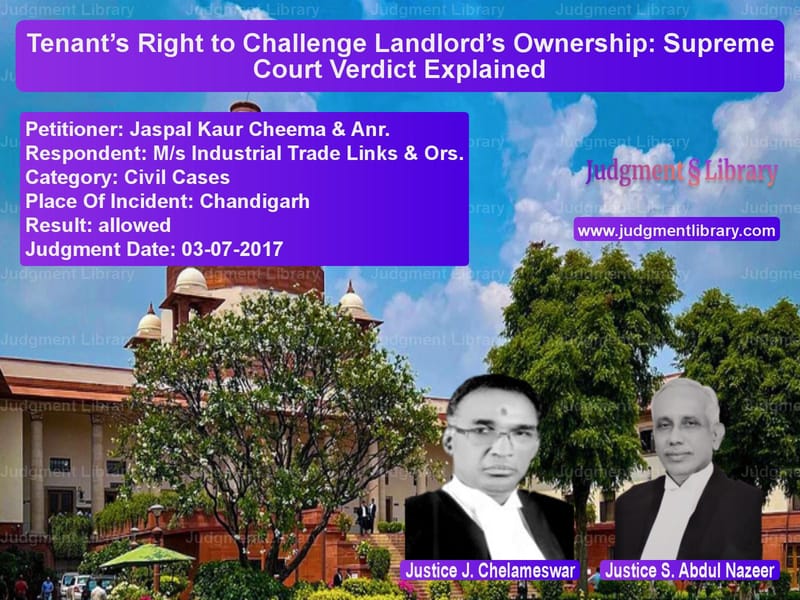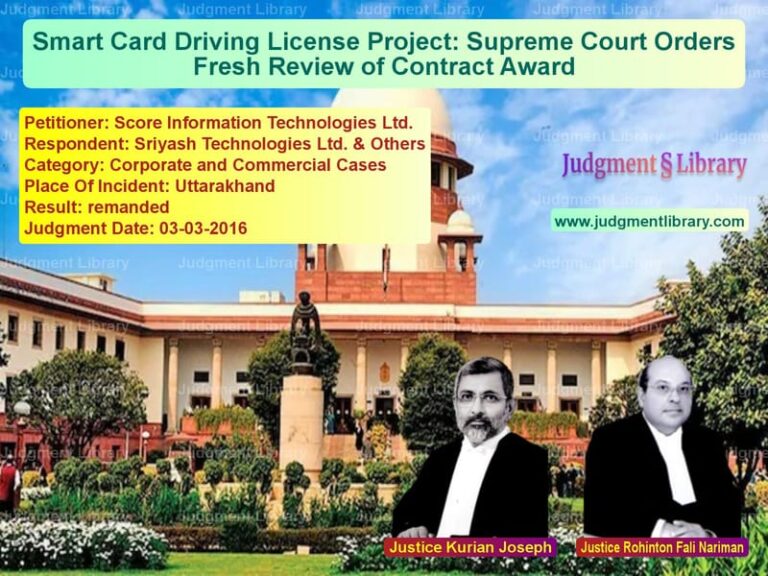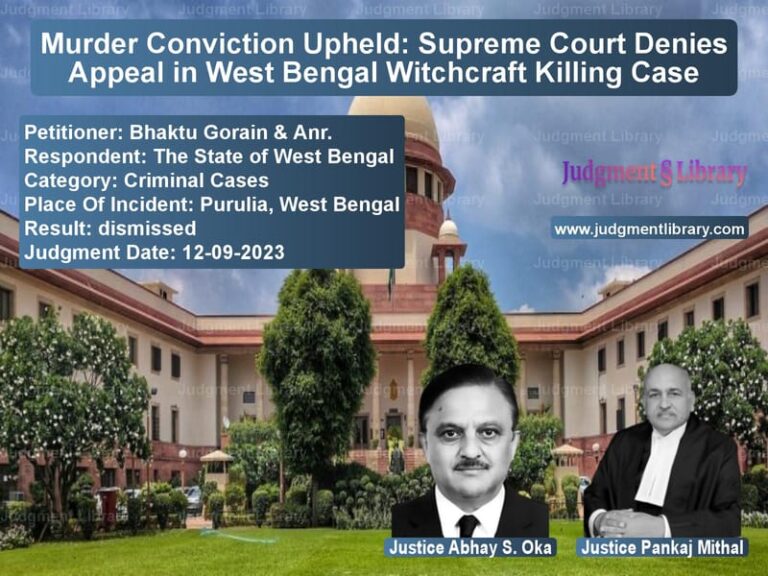Tenant’s Right to Challenge Landlord’s Ownership: Supreme Court Verdict Explained
The case of Jaspal Kaur Cheema & Anr. vs. M/s Industrial Trade Links & Ors. revolves around an eviction dispute under the East Punjab Urban Rent Restriction Act, 1949. The primary issue before the Supreme Court was whether tenants could amend their written statement to challenge the ownership of the landlord after having accepted tenancy and lease agreements.
The Supreme Court addressed critical aspects of tenancy laws, landlord rights, and the principle of estoppel under Section 116 of the Indian Evidence Act, 1872. The ruling clarifies whether tenants can deny their landlord’s ownership after accepting tenancy terms and benefiting from possession of the property.
Background of the Case
The appellants, Jaspal Kaur Cheema and another, filed an eviction petition under Section 13 of the East Punjab Urban Rent Restriction Act, 1949, against the respondents, M/s Industrial Trade Links and others. The dispute involved 200 square feet of rental space on the ground floor of Industrial Shed No. 93, Industrial Area, Ram Darbar, Phase–II, Chandigarh.
The appellants claimed they needed the premises for their personal use. The respondents initially contested the eviction petition but later sought to amend their written statement, asserting that the appellants were not the actual owners of the premises and that the sole proprietor was Smt. Raj Nanda. They argued that the eviction petition was not filed for genuine personal necessity.
The Rent Controller dismissed the respondents’ application for amendment. However, the Punjab and Haryana High Court reversed this decision and allowed the amendment. Aggrieved by this, the appellants approached the Supreme Court.
Petitioners’ Arguments
The appellants, represented by Senior Counsel Nidhesh Gupta, put forth the following arguments:
- The respondents had signed a lease agreement dated May 16, 2006, acknowledging the appellants as owners.
- The respondents did not contest ownership in their original written statement, making a general denial insufficient under Order 8 Rule 3 and Rule 5 of the Civil Procedure Code (CPC).
- Section 116 of the Indian Evidence Act prohibits a tenant from challenging the title of the landlord during the subsistence of tenancy.
- The tenants had admitted ownership in their cross-examination, making their later challenge legally untenable.
Respondents’ Arguments
The respondents, represented by Advocate Nirmata Shergill, countered with the following points:
- The appellants were mere power of attorney holders of Smt. Raj Nanda and could not claim personal necessity for eviction.
- They sought to introduce this plea through an amendment in their written statement.
- The High Court was correct in allowing the amendment as per precedents that permit adding a defense to elaborate an existing plea.
Supreme Court’s Observations and Judgment
The Supreme Court, in a judgment delivered by Justice S. Abdul Nazeer, upheld the Rent Controller’s decision and ruled in favor of the appellants. The key observations were:
- The respondents were bound by the terms of the lease agreement, where they acknowledged the appellants as landlords.
- “A tenant who has been let into possession cannot deny his landlord’s title, however defective it may be, so long as he has not openly restored possession by surrender.”
- Under Order 8 Rule 5 CPC, a defendant must categorically deny statements in the plaint, or they will be deemed admitted.
- “Failure to make a specific denial amounts to an admission.”
- The plea to challenge ownership at a belated stage was an afterthought, and allowing such amendments would defeat the purpose of tenancy laws.
The Supreme Court restored the Rent Controller’s order and set aside the High Court’s ruling, affirming that the tenants could not amend their statement to deny ownership of the landlords.
Key Legal Takeaways
The judgment establishes the following legal principles:
- Estoppel Against Tenants: A tenant is barred from challenging the landlord’s ownership once tenancy has been accepted.
- Requirement for Specific Denials: General denials in pleadings are insufficient; clear and specific objections must be made at the earliest stage.
- Amendment of Written Statements: Defendants cannot introduce amendments to challenge the landlord’s ownership after initially accepting tenancy terms.
Impact of the Judgment
This ruling has significant implications for landlords and tenants:
- It reinforces that tenants cannot dispute ownership once they have entered into a lease agreement.
- It prevents unnecessary delays in eviction proceedings caused by frivolous amendments to pleadings.
- It strengthens the legal standing of landlords seeking eviction on personal necessity grounds.
Conclusion
The Supreme Court’s decision in Jaspal Kaur Cheema & Anr. vs. M/s Industrial Trade Links & Ors. reaffirms the fundamental principle that tenants cannot question the ownership of their landlords during the subsistence of tenancy. The ruling ensures that tenancy agreements remain legally binding and that eviction proceedings are not delayed by baseless challenges.
This judgment serves as an essential precedent for landlords facing similar disputes, ensuring that legal principles governing landlord-tenant relationships are upheld in courts.
Don’t miss out on the full details! Download the complete judgment in PDF format below and gain valuable insights instantly!
Download Judgment: Jaspal Kaur Cheema & vs Ms Industrial Trade Supreme Court of India Judgment Dated 03-07-2017.pdf
Direct Downlaod Judgment: Direct downlaod this Judgment
See all petitions in Landlord-Tenant Disputes
See all petitions in Property Disputes
See all petitions in Contract Disputes
See all petitions in Judgment by J. Chelameswar
See all petitions in Judgment by S. Abdul Nazeer
See all petitions in allowed
See all petitions in supreme court of India judgments July 2017
See all petitions in 2017 judgments
See all posts in Civil Cases Category
See all allowed petitions in Civil Cases Category
See all Dismissed petitions in Civil Cases Category
See all partially allowed petitions in Civil Cases Category







